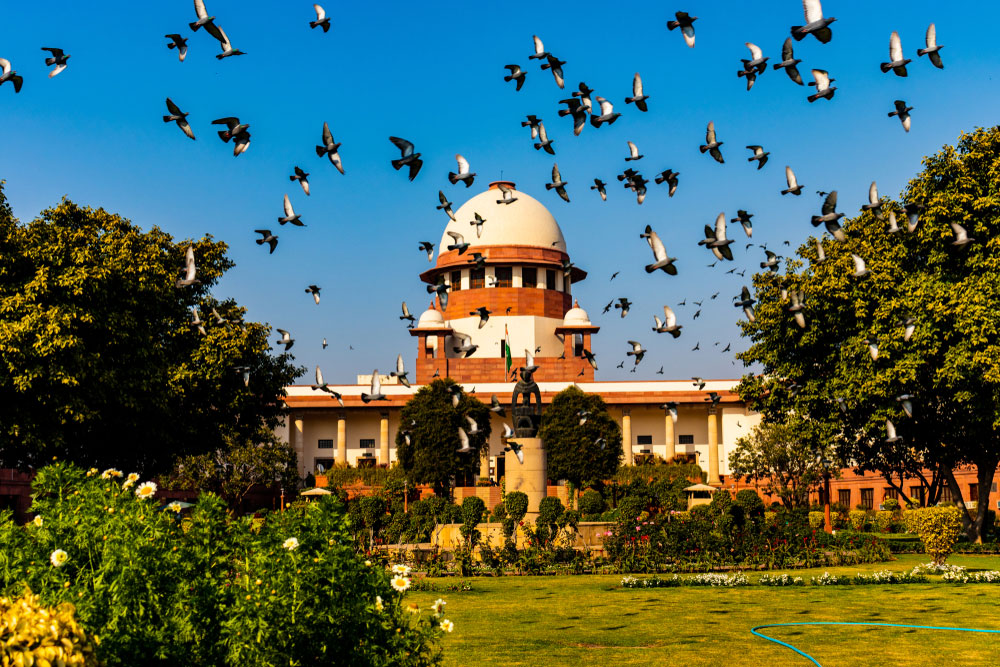The Supreme Court has decided to examine the question whether a Muslim girl who has reached puberty can marry a person of her choice under Mohammedan law even if she is below 18.
According to the general law, a girl has to be at least 18 and the groom 21 to be eligible to enter into wedlock.
A bench of Justices N.V. Ramana, Indira Banerjee and Ajay Rastogi asked Dushyant Parashar, the advocate for the girl and her husband Javed Ahmed, to serve a copy of their appeal to the Uttar Pradesh government and posted the matter for further hearing after two weeks.
The girl, who is around 16, had got married to Javed, an adult, on June 22 against her family’s wishes. Her father then approached Ram Gaon police station in Bahraich district and filed a complaint under penal code Sections 363 and 366.
Under Section 363, which deals with kidnapping, the maximum punishment is jail for seven years.
The maximum jail term under Section 366 (kidnapping/abduction of a woman with the purpose of marriage or establishing illegal physical relationship) is 10 years.
Although the girl said she had married Javed of her own free will, a judicial magistrate sent her to the custody of the district child welfare committee.
The couple then filed a habeas corpus petition in Allahabad High Court, saying she was above 15 and had married a person she loved. So the directive to send her to the Nari Niketan amounted to illegal detention.
They also contended that under Mohammedan law she could marry after reaching puberty and the minimum age of 18 for a girl under the general law was not applicable in her case.
The high court, however, dismissed her petition on the ground that she was a juvenile under the Juvenile Justice (Care and Protection) Act, 2015, and therefore the marriage was void.
The couple then moved the Supreme Court pleading that the high court’s directives went against the law the top court had laid down in the Shafin Jahan vs Asokan case last year.
The 2018 case was about a young woman, Hadiya, then a 24-year-old from Kerala, who had converted to Islam in 2013 and married a Muslim man, Shafin Jahan, in December 2016.
Kerala High Court had annulled the marriage following a plea filed by her father, Asokan, on the ground that the inter-community marriage was part of an orchestrated love jihad conspiracy by some fundamentalist organisations.
But the top court in its ruling had said that under Mohammedan law: “Hadiya and Shafin Jahan are adults. Under Muslim law, marriage or nikah is a contract. Muslim law recognises the right of adults to marry by their own free will.”
The conditions for a valid Muslim marriage, the court said, were:
- Both the individuals must profess Islam,
- Both should be of the age of puberty,
- There has to be an offer and acceptance and two witnesses must be present,
- (Payment of) dower and mehar (mandatory payment, in the form of money or possessions, paid by the groom to the bride at the time of marriage); and
- Absence of a prohibited degree of relationship.
The teenaged girl and her husband cited these points in their appeal against the Allahabad High Court’s order.
On the “touchstone of the law as laid down by this Hon’ble Court”, they said, “both the petitioners profess Islam and both have attained the age of puberty”.
Further, they said, “by giving and taking dower and mehar, (they) have performed nikah, by drawing (up a) nikahnama” In “such facts and circumstances the Hon’ble High Court ought to have set ‘the girl’ at liberty…,” the appeal said.










